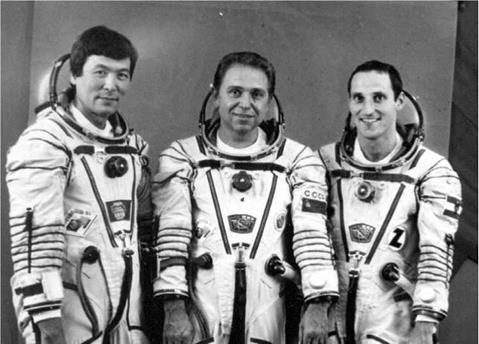. SOYUZ TM13
Flight Crew
VOLKOV, Alexandr Alexandrovich, 43, commander, 3rd mission Previous missions: Soyuz T14 (1985); Soyuz TM7 (1988)
AUBAKIROV, Toktar Ongarbayevich, 45, civilian, Kazakhstan cosmonaut researcher
VIEHBOCK, Franz, civilian, 31, Austrian cosmonaut researcher
Flight Log
The docking of Soyuz TM13 to the Mir complex was one of the smoothest yet seen in the Russian programme. Aubakirov’s primary objective was photography of Earth resources, especially of his native Kazakhstan and in particular related to Project Aral-91, which monitored dust and aerosol particles blowing off recently exposed parts of the Aral Sea. The programme included two biotechnological experiments and a series of standard medical tests, as well as his participation in several of the on-going Mir experiments. The cosmonaut’s photographs helped supplement the ground – and air-based monitoring of the particles. Viehbock’s Austrian experiment programme had been supplemented by the delivery of 150 kg of apparatus aboard Progress M9, which had docked earlier. The programme featured fourteen experiments comprising ten biomedical, three materials processing and one Earth observation investigation. Both cosmonaut researchers returned with EO-9 commander Artsebarsky in TM12 on 10 October, leaving Volkov and Krikalev to continue the EO-10 programme.
Krikalev’s adaptation to life aboard Mir helped ease the transition from the EO-9 to the EO-10 residency. One major task was to re-qualify the automatic Kurs docking system on the front port of Mir using Soyuz TM13. After several test approaches on 15 October, the system performed a successful automated docking. Just four days
|
The Soyuz TM13 crew of Aubakirov (left), Volkov (centre) and Viehbock |
later, however, Progress M10 aborted its initial approach, only successfully docking with Mir on 21 October. Clearly, Kurs at the front port was still having difficulties.
While the two cosmonauts resumed their research programme of Earth resources, materials processing, astrophysical studies and biomedical experiments, down on Earth, the Soviet Union was in turmoil. The demise of the USSR occurred on 25 December 1991, with the country officially ceasing to exist by the turn of the year to be replaced by the Russian state and the Commonwealth of Independent States (CIS). The once-proud Soviet space programme now became the Russian space programme and was almost immediately dogged by severe budget restrictions, interstate disputes and great uncertainty. Work on Mir continued, but the question was for how long. The ocean-going tracking ships used since the 1960s were phased out in order to save money and resulted in Mir being out of radio contact with mission control for up to nine hours every day. In early 1992, flight controllers went on strike for higher rates of pay during the flight of Progress M11, but did not interfere with the docking.
The crew’s only EVA on 20 February was quickly revised when the heat exchanger in Volkov’s Orlan DMA pressure suit failed. Restricted to remaining close to the EVA hatch, he could only assist Krikalev, who was now on his seventh EVA in less than a year (and set a new cumulative EVA total of over 36 hours). Volkov assisted in installing equipment near the hatch, but could not operate the Strela boom to move
Krikalev to the Kvant module. Krikalev had to move hand-over-hand across the station to the worksite. Once there, he dismantled the equipment used to build Sofora in 1991, and then cleaned Kvant l’s camera lenses and collected samples of the solar cell added to the third (top) array base block in 1988.
In March 1992, after hosting the German Mir-92 mission operated by cosmonaut Klaus Flade, Volkov and Krikalev returned to Earth along with the German cosmonaut, but to a new homeland. Again, all three cosmonauts who landed had travelled to Mir on different vehicles.
Milestones
145th manned space flight
72nd Soviet (now Russian) manned space flight
65th Soyuz manned space flight
12th Soyuz TM manned flight
20th Soviet/Russian and 44th flight with EVA operations 1st flight of ethnic Kazakh in space 1st Austrian in space











